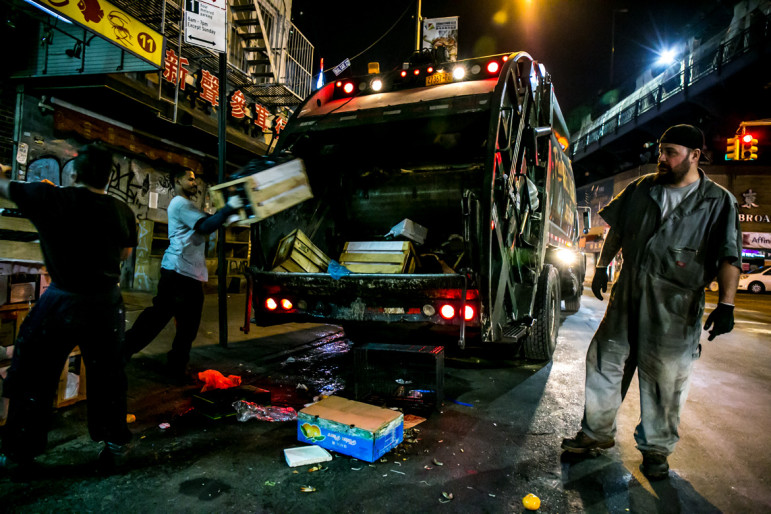“Our city faces historic threats from climate change, rising social inequality, and major cuts to federal funding. Now, more than ever, we need to modernize our outdated private sanitation system.”

Adi Talwar
A 2012 study estimated that the city generates between 3.5 million and 5.5 million tons of commercial waste per year.Five years ago, the City Council and Mayor Bill de Blasio passed major legislation promising to reform New York City’s private sanitation system—an industry notorious for worker exploitation, dumping waste in outer-borough environmental justice communities, confusing or nonexistent recycling services, unsafe trucks and driving practices, and poor customer service.
With the impending transition to a federal government opposed to environmental justice, climate, and worker safety programs, new Sanitation Commissioner Jimmy Oddo and Mayor Eric Adams can make immediate, concrete progress on the City’s environmental justice, climate, and public safety goals by fully implementing the citywide Commercial Waste Zones (CWZ) program mandated by Local Law 199 of 2019.
This new system aims to change the rules of a long-running game in which waste haulers have been incentivized to engage in a “race to the bottom,” cutting corners on wages, safety, environmental rules, and customer service as thousands of trucks zig-zag the city, working long overnight routes and competing to collect the massive piles of garbage set out by businesses ranging from grocery stores to offices and hospitals.
The CWZ law passed in 2019 after years of intensive study and debate by the Department of Sanitation (DSNY), the Business Integrity Commission, the City Council, and a diverse set of labor, environmental justice, climate, safe streets, and business stakeholders.
It directs the city to select up to three private haulers to operate in each commercial district on criteria including labor standards, environmental standards, route efficiency, safety practices, and pricing, and then directs the Department of Sanitation to negotiate and enforce legally binding contracts with these companies to ensure that bad actors cannot continue to cut corners to undermine the new standards or their competitors.
Five years in, progress has begun but it has been excruciatingly slow. After years of pandemic-related delays, DSNY has announced selected haulers for each zone, but is currently implementing the new program in just one zone in Central Queens, with improvements in all of the city’s 19 other zones not expected until next year or later.
The City Council and Mayor de Blasio clearly intended for CWZ to be a historic, nation-leading program that could quickly eliminate more than 12 million unnecessary truck miles annually; reduce, compost, and recycle millions of tons of waste currently being trucked to far-flung landfills and incinerators; create thousands of good hauling, composting, and recycling jobs; and eliminate or sharply reduce dozens of serious crashes resulting in injuries and deaths each year.
The CWZ system would also reward responsible companies in the waste industry, enabling them to make overdue, long-term investments in recycling infrastructure, modern safety equipment, and customer service systems, and to restructure private sanitation as a family-sustaining career rather than a short-term, dangerous job.
On this anniversary, the concerns that motivated the passage of the CWZ Law have only multiplied: our city faces historic threats from climate change, rising social inequality, and major cuts to federal funding. Now, more than ever, we need to modernize our outdated private sanitation system so that New York can be a cleaner, safer, and healthier city.
The good news is that rapid transition to a more sustainable and just waste management system is firmly within the city’s control. We look forward to working with Commissioner Oddo and Mayor Adams to make immediate and meaningful strides in reducing pollution, protecting disadvantaged communities, uplifting workers, making our streets safer, and creating good local jobs by fully implementing the Commercial Waste Zones program that was studied, planned, debated, and resoundingly passed more than five years ago.
Celeste Perez is the state climate policy manager at the New York City Environmental Justice Alliance (NYC-EJA). Jenille Scott is the climate director at the labor and climate justice organization ALIGN. Justin Wood is the director of policy at New York Lawyers for the Public Interest (NYLPI)








